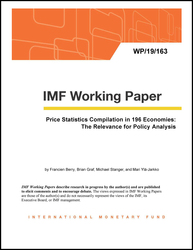
Price Statistics Compilation in 196 Economies: The Relevance for Policy Analysis
The consumer price index (CPI) is a key economic indicator used to gauge inflation, adjust wages, pensions, and social benefits. The producer prices index (PPI) is used for forecasting and deflating GDP estimates. Both indexes are used by the Fund, policymakers, and researchers for global, regional, and domestic surveillance. In this context, the paper evaluates the soundness of the indexes by assessing four major criteria: frequency of updating the weights, the index coverage, timeliness, and the use of international classifications. We discuss online and scanner data as frontier issues. The study shows that the CPI is universally and frequently compiled, timely, and fairly-well aligned with international standards. However, the weights used to compile the index are updated in only 45 percent of economies and have national coverage in 76 percent. PPIs, compiled by only 126 economies are timely, but there is scope for continued improvement as only 36 percent of economies have updated PPI weights and approximately 67 percent maintain the recommended coverage. Outdated weights impact the reliability of the indexes for policy analysis. Frequently updated weights and well-represented coverage mitigate against biases and ensure that the indexes properly measure the price evolution in the economy.
Publication date: July 2019
ISBN: 9781513508313
$18.00
Add to Cart by clicking price of the language and format you'd like to purchase
Available Languages and Formats
| English |
Prices in red indicate formats that are not yet available but are forthcoming.
Topics covered in this book
This title contains information about the following subjects.
Click on a subject if you would like to see other titles with the same subjects.
Price Index , CPI , PPI , Scanner data , Big data , Macroeconomic Statistics , PPIs
Summary
Copyright © 2010 - 2025
Powered by:
AIDC



